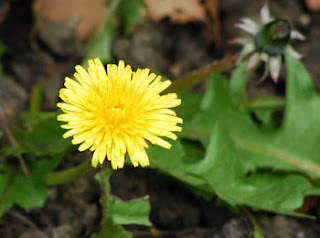Organic Fertilizers was the topic of a discussion I gave at our local arboretum on Wednesday. Cox Arboretum is one facility of our Five Rivers Metro Parks here in the Dayton, Ohio area. We had a 'Lunch and Learn' program discussing the benefits of organic fertilizers. As the session progressed, I had several questions regarding Organic Lawn Maintenance, specifically weed controls.
Check out some of these bad boys!
Plantain - loves damp, heavy soil. Organic fertilizers and compost will loosen soil, and help grass to push out weed.

So, since weeds are popping up all over, let's talk Organic Weed Control.
Weeds in landscape beds are easily maintained with mulch. A two to three inch layer of any form of mulch will keep weed seeds from germinating. Hardwoods, pine needles, even newspaper will work well to smother weeds and if weeds to pop up, they are more shallow rooted and easy to pull.
Weeds in lawns, however are another matter! The most important step to a weed free lawn is to 'mow high, water deeply'. The tall grass shades any weed seeds. Watering deeply develops deep roots of the turf and a healthy yard will choke out weeds.
Check out some of these bad boys!
Plantain - loves damp, heavy soil. Organic fertilizers and compost will loosen soil, and help grass to push out weed.
This guy is bindweed. Often mistaken for morning glory, bindweed is really hard to control. It vines over shrubs, and perennials in the garden and can suffocate them. Pulling doesn't work! Digging the roots is effective eventually, but you need to be persistent. Cut off flowers so they don't produce seeds. I try to hit as many leaves as possible with an herbicidal soap or non-selective herbicide like Burn Out II
 . As a non-selective herbicide, applying them to just the weed is important, since this product will kill anything it is sprayed on, including grass and other desirable plants in the landscape.
. As a non-selective herbicide, applying them to just the weed is important, since this product will kill anything it is sprayed on, including grass and other desirable plants in the landscape.
 . As a non-selective herbicide, applying them to just the weed is important, since this product will kill anything it is sprayed on, including grass and other desirable plants in the landscape.
. As a non-selective herbicide, applying them to just the weed is important, since this product will kill anything it is sprayed on, including grass and other desirable plants in the landscape.
Dandelion's have a deep taproot. Digging them will work if you get the complete root. Here is a trick I'll share with you. Weeds like a soil pH of 7.5 which is considered alkaline. Grass likes a pH of 6.5. So by adding a sulfur powder to your lawn or applying seed derived organic fertilizer like alfalfa (which is somewhat acidic), the grass will thrive, and the weeds won't. The non-selective herbicides will work here too.
The other lawn problem that folks asked about is clover. If you have clover, it is a sign of low nitrogen soil. Fertilize to maintain a healthy lawn and reduce clover. Clover is a nitrogen fixer which draws nitrogen from the atmosphere. It is green, and if mowed, flowers are minimal. So maybe we can live with this one!

Crabgrass is an annual grass that is controlled easily. Agralawn Crabgrass Killer is product is made from cinnamon bark will also control chickweed, and clover. Apply to weed surface and results will be noticeable in 2-4 days.
is product is made from cinnamon bark will also control chickweed, and clover. Apply to weed surface and results will be noticeable in 2-4 days.
Once weeds get a hold in the lawn, there are several organic products that will dry out the leaves, causing the weed to eventually die. One product I like is Horticultural vinegar . Unlike kitchen vinegar that is 5% acidic acid, horticultural vinegar is 20%. As the ingredient 'acid' hints, weeds don't like lower pH levels and pH levels of this product is about 4 - 5 - very acidic.
. Unlike kitchen vinegar that is 5% acidic acid, horticultural vinegar is 20%. As the ingredient 'acid' hints, weeds don't like lower pH levels and pH levels of this product is about 4 - 5 - very acidic.
Manual methods effective in weed control. Use the two tools at the end of your arms.
Weeds have been around for ever, and the range of tools to deal with them go way back to mid-evil times.
Modern technology in the herbicide industry is not proving to be better. Chemicals like 2,4-D, are effective, but the health risks they pose are many. Especially in children and pets whose bodies small, illness are widely documented. Non-Hodgkin's lymphoma, endocrine disruptions, reproductive and development effects can all be attributed to chemical herbicides and pesticides. Playgrounds, golf courses, and the home lawn and vegetable gardens have had tons of these chemicals applied. Is it any wonder that we are turning to organic products for safe and effective controls for our lawns and gardens?
Thanks for visiting. Leave a comment and let me know you were here. Until next time - Claudia












1 comment:
What a useful post! Ironically, the one thing I have to kill is a large crape myrtle that was planted too close to the house by the builders. The landscapers here in northern florida have this habit of sawing crapes to stumps every winter, which makes it come back with a lot of congested water sprouts. The form is ruined, and it sprawls out against the house (and the foundation!) and into the driveway. Any idea of how to knock it out in an organic manner?
Post a Comment